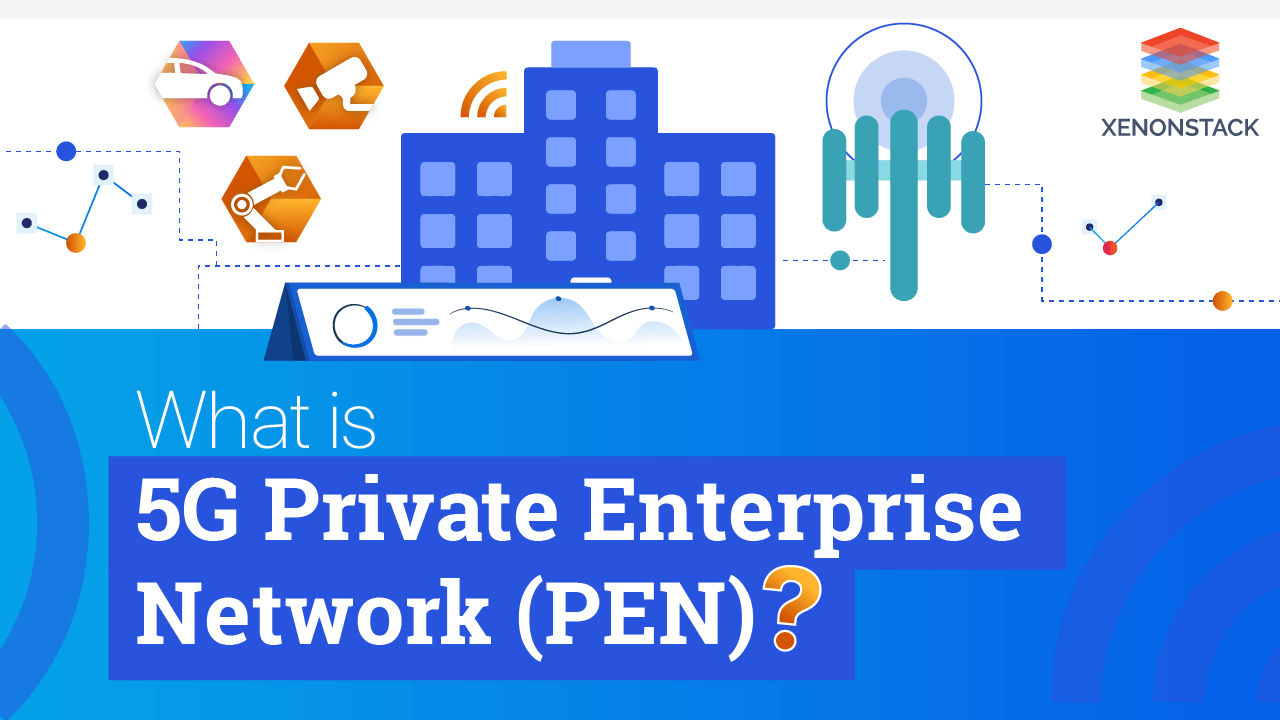
Introduction
Wireless networks, known as private enterprise networks (PENs), are those that are owned and managed by a single company or organization for their sole usage. The internal business processes of the company, such as communication between personnel, equipment, and systems, are created to offer a secure and dependable communication infrastructure.
5G technology can be used to install PENs, among other things. The fifth generation (5G) of cellular technology offers higher speeds and reduced latency than earlier generations. Because it enables the establishment of specialized, private networks that may be used for particular applications and that can be tailored to match the needs of the business, it is especially well suited for PENs.
The new 5G core network will follow a service-based architecture (SBA), enabling the adoption of cloud-native technologies and open-source software in communication networks, bringing more collaboration, innovation, and openness.Know more here : Edge Computing with 5G
What are the Advantages of PEN?
Using a 5G PEN has a number of advantages. For instance, because it is not open to the public, it can offer a higher level of security than a public network. As it is not subject to the same congestion and interference as a public network, it can offer a more dependable and consistent connection. A 5G PEN can also be modified to match the particular requirements of the company, enabling the deployment of unique applications and services.
Why Do We need PEN?
Private enterprise networks (PENs) are beneficial for corporations and organizations for a number of reasons. Among the key advantages of PENs are:
Security: Unreachable by others, PENs offer a private and secure communication infrastructure. This can guard against illegal network access and safeguard critical data.
Reliability:
PENs are not affected by the same congestion and interference as public networks, so they can offer a more dependable and consistent connection than a public network. For mission-critical applications that demand a high level of uptime, this may be very crucial.
Customization:
PENs can be tailored to a company's unique requirements, enabling the deployment of bespoke software and services. This can aid companies in increasing productivity and operational efficiency.
Cost savings:
Since PENs do not need the payment for access to a shared network, they may be more affordable than accessing a public network.
For enterprises and organizations aiming to boost internal communication and operational effectiveness, PENs provide a practical and adaptable option.
Use Case: PEN for Universities
For many of the same reasons that private enterprise networks (PENs) are valuable for other businesses and organizations, colleges can also benefit from them.
The following are some potential advantages of PENs for universities:
Security:
PENs provide a secure and private communication infrastructure that is not accessible to outsiders. This can help to protect sensitive data, such as student records and research findings, and prevent unauthorized access to the network.
Reliability:
PENs can provide a more reliable and stable connection than a public network, as they are not subject to the same congestion and interference. This can be important for universities, as they often have many users accessing the network at any given time.
Customization:
PENs can be customized to meet the specific needs of the university, allowing for the deployment of specialized applications and services. This can include educational resources and tools, as well as administrative systems.
Cost savings:
PENs can potentially offer cost savings compared to using a public network, as the university does not have to pay for access to a shared network.
Generally, PENs can be a valuable tool for universities looking to improve their internal communication and operational efficiency. They can provide a secure and reliable communication infrastructure that is customized to meet the specific needs of the institution.
Use Case: PEN: Cities
Cities can use private enterprise networks (PENs) to enhance staff communication and collaboration and to streamline the provision of services to people. PENs could be used in a variety of urban settings, such as:
Public safety:
PENs can help public safety organizations, such as the police, fire, and emergency medical services, communicate and work together. This can facilitate better coordination of emergency response efforts and response times.
Transportation:
Systems, including buses, railroads, and traffic management systems, may all be controlled and communicated using PENs. This may aid in enhancing the effectiveness and dependability of these systems.
Utility systems, including those for water, electricity, and gas, can be communicated with and controlled using PENs. This may aid in enhancing the effectiveness and dependability of these systems.
Public services:
PENs can be used to facilitate the delivery of public services, such as social services, healthcare, and education. This can help to improve the accessibility and quality of these services.
What are the future trends of PEN?
Several trends are likely to shape the future of private enterprise networks.
(PENs): Increased adoption of 5G:
As 5G technology becomes more widely available and cost-effective, it is likely that more businesses and organizations will adopt 5G PENs. 5G offers faster speeds and lower latency than previous generations of cellular technology, making it well-suited for applications that require high-bandwidth and low-latency communication.
Growth of the Internet of Things (IoT):
As the number of connected devices continues to grow, PENs will likely play an increasingly important role in supporting the communication and control of these devices. PENs can be used to connect and manage a wide variety of IoT devices and systems, such as smart lighting, security systems, and environmental monitoring systems.
Increased focus on security:
As the importance of protecting sensitive data and preventing unauthorized access to networks grows, PENs will likely continue to be a popular choice for businesses and organizations due to their inherent security advantages.
Development of new applications and services:
As PENs become more widely adopted, it is likely that new applications and services will be developed that take advantage of the unique capabilities of these networks. This could include the deployment of specialized applications for specific industries or the development of new services that leverage the high-bandwidth and low-latency capabilities of 5G PENs.
Overall, the future of PENs looks bright, with continued growth and innovation likely in the coming years.
Conclusion:
In general, 5G PENs provide a practical and adaptable solution for companies and organizations aiming to boost internal communication and operational effectiveness.
- Discover more about Artificial Intelligence in Edge Computing
- Discover more about EdgeOps Platform Benefits and Working


